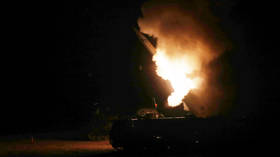Ban of Islamist group distributing Koran ‘could lead to their further radicalization’
Should everyone, including Islamist radicals, be allowed to speak up as long as they don’t break the law? Should their views be countered by words alone? Can freedom be sacrificed for the sake of security? RT discussed with analysts.
In Switzerland, authorities have admitted they cannot ban a Salafist group known as True Religion despite grave security concerns over “forbidden activities.”
“We cannot ban the organization because they are not organized; there is no address or something like that. We have given our recommendation. The cities will have to act,” Zurich Department of Security spokesman Urs Grob told RT.
On Friday, Zurich’s public safety office recommended banning the Islamic ‘READ!’ campaign, which hands out Korans in public spaces. They are afraid it could incite radical activities, including jihadist involvement.
The German-based organization has distributed millions of Korans across Europe, including Switzerland.
Last November, however, True Religion was banned in Germany following police raids and a criminal investigation against its members, after they were found to be recruiting people to join radicals in Iraq and Syria.
RT spoke to Claudio Zanetti, secretary for the Swiss People’s Party (SVC) in the canton of Zurich and Jahan Mahmood, former UK government counter-extremism adviser, and asked what they think about this situation. Should Switzerland follow in Germany’s footsteps and ban the group?
Claudio Zanetti says he sees no problem with people distributing the Koran as long as they don’t violate the law. He added that he wouldn’t mind Christian priests doing the same and handing out Bibles in the streets, but that never happens.
In his opinion, there are no problems with security and direct democracy in Switzerland: “we are in a stable situation here.”
“When something is illegal, we can stop it, we arrest those people,” he said. “But here in Switzerland, our individual freedom is very important, also it is said in our Constitution that those are free who use their freedom,” he continued.
“So, if they just distribute the Koran, I have no problem with that. But if they cross the red line, then we have the police, we have prisons, and the state is obliged to do whatever is needed,” Zanetti added.
“We have an open society and we give the freedom to the people as long as this freedom is not abused,” he said.
The situation in Germany is different though – because of their “welcome policy” a lot of radical Islamists got into the country, Zanetti said.
He argued that “the police and [Swiss] officials have to act according to the law. They cannot just recommend something because they like someone or they dislike. We have laws in this country. And if these people are against the law, then go and catch them.”
Counter-extremism expert Jahan Mahmood thinks that banning groups like True Religion may only worsen things.
“If you close some of these groups down or you ban them, they go underground and cause more problems and more harm,” he told RT.
According to Mahmood, “the best solution to something like this is by creating a kind of counter-protest by allowing members of the Muslim community to challenge and counter some of their views.”
Mahmood said, “we could end up contravening a very important value of expression that has taken so many years to come to. Why would we want to allow even the extremists, to be fair, to behave in such a way that we end up losing exactly what we stand for? That means they win and we lose.”
“The problem with harassment and that form of intervention is that these groups could become even more radicalized and cause more trouble. It is best to keep them in the open. And to operate at that level rather than let them go underground and cause more harm and be involved in more sinister militias,” Mahmood told RT.
In Mahmood’s view, unless there is evidence, “I don’t think we are in a position to just vilify and probably prosecute people.”
“And what we don’t want to do is going too hard, too fast to distract them in such a way that they feel that they are being harassed to the point of making them more extreme and radical than they were before,” he said.
The statements, views and opinions expressed in this column are solely those of the author and do not necessarily represent those of RT.















